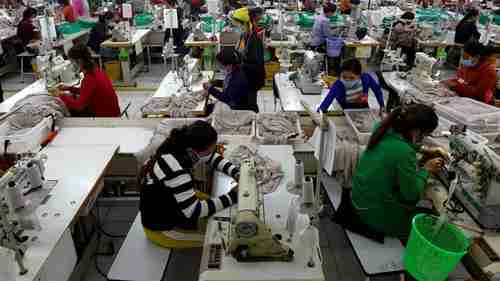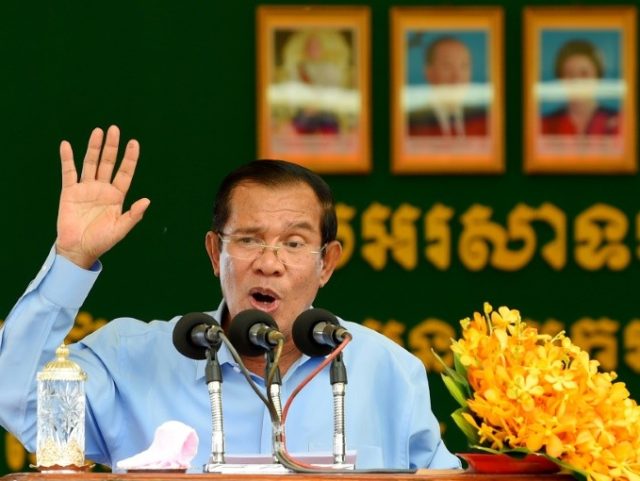This morning’s key headlines from GenerationalDynamics.com
- Cambodia’s Hun Sen threatens to kill opposition politicians if E.U. ends preferences
- Brief generational history of Cambodia
Cambodia’s Hun Sen threatens to kill opposition politicians if E.U. ends preferences

Employees at Cambodian clothes factory whose business is benefiting from E.U. trade preferences (Reuters)
Cambodia’s Prime Minister Hun Sen is threatening to kill opposition politicians if the European Union revokes its grant of trade preferences to Cambodia.
The trade preference program, known as the Generalized Scheme of Preferences (GSP), grants to Myanmar the right to export goods to the E.U. without paying tariffs. The GSP “Everything But Arms” (EBA) status allows Cambodia to sell any goods except weapons tariff-free into the E.U.
The E.U. threat follows elections last year in July when Hun Sen’s party won all 125 parliamentary seats up for election. To guarantee his victory, early last year Hun Sen jailed Kem Sokha, the leader of the opposition Cambodia National Rescue party (CNRP), the only viable opposition party, and then ordered the complete dissolution of the CNRP.
On Monday, Hun Sen threatened to retaliate against CNRP politicians if the trade preferences were withdrawn, and that critics should be prepared to flee to other countries: “If you (the EU) want the opposition dead, just cut it [the EBA]. If you want the opposition alive, don’t do it and come and hold talks together. People are prepared to flee, be prepared. I won’t forgive them.”
At the request of Hun Sen, Cambodia’s Supreme Court banned 118 CNRP party members in 2017, accusing them of working with the United States to plot a coup. These 118 people are presumably the ones who would be at risk of retaliation if E.U. withdraws the trade preferences.
The E.U. is also considering withdrawing the same EBA trade preferences from Myanmar (Burma) for the human rights atrocities associated with the government’s actions, led by Buddhist Monk Ashin Wirathu, of torture, beatings, rape, ethnic cleansing, and genocide of Muslim Rohingyas in Rakhine State. ( EU considers revoking Myanmar’s trade preferences because of Rohingya genocide (05-Jan-2019))
Hun Sen regularly threatens violence against political critics. At an ASEAN summit meeting held a year ago in Sydney, Australia, he and Myanmar leaders were both met with large groups protesting human rights violations in both countries. Hun Sen warned protesters, “I will follow you all the way to your doorstep and beat you right there … I can use violence against you.” There have been no reports that he followed up on these threats. Asia Times and Reuters
Brief generational history of Cambodia
Hun Sen is following the same generational pattern that I have described in numerous leaders from other countries, such as Bashar al-Assad in Syria, Paul Biya in Cameroon, Pierre Nkurunziza in Burundi, Paul Kagame in Rwanda, the military junta in Thailand, Yoweri Museveni in Uganda, Robert Mugabe in Zimbabwe, Salva Kiir in South Sudan, and Joseph Kabila in DRC.
What these countries have in common is that the previous generational crisis war was a bloody ethnic or tribal civil war. After the war ends, the leader of the country, usually from the winning tribe or ethnic group, refuses to give up power and becomes increasingly violent and authoritarian, using as an excuse that peaceful protests or negative news articles can turn into a new civil war. This excuse provides justification for mass slaughter, rape, torture, mass jailings, mutilations, and so forth. This happens in country after country, differing only in level of violence. Bashar al-Assad in Syria exhibits the most violence, using missiles, barrel bombs, Sarin gas, chlorine gas, and other atrocities on hospitals, marketplaces, schools, and civilian neighborhood, resulting in genocide and ethnic cleansing of his Sunni Arab political enemies. ( “1-Dec-18 World View — Evidence grows of Assad’s ‘final solution’, extermination of Arab Sunnis in Syria”)
Cambodian culture dates back to at least 5000 BC. During the period 500 BC to 500 AD, the Khmer people in Cambodia were strongly influenced by Indian culture, via India traders, bureaucrats, and priests. When Khmer became a written language in about 300 AD, Indian characters were adapted for its alphabet. Cambodia adopted some Indian gods, but not the caste system of Hinduism. In the 1200s, there was a mass conversion of Cambodians to Theravada Buddhism, a religion that was also adopted by the neighboring Thais. There were several centuries of wars between the Khmer and the Thais until the French arrived in the 1860s.
Cambodia became a French protectorate in 1863. Cambodia gained independence from France in 1953 and supported the North Vietnamese against the South Vietnamese and the Americans in America’s Vietnam War. It is easy to underestimate the horror of what happened next, since in the vitriolic political atmosphere following the Vietnam War, leftists like Jane Fonda vocally denied it was even going on, saying “I will never criticize a Communist government.”
And yet, the Buddhist society of the China-backed Khmer Rouge in Cambodia in 1975-79, led by Pol Pot, perpetrated one of the three or four top mass genocides of the 20th century, comparable to the huge genocides of Adolf Hitler, Josef Stalin, and Mao Zedong.
The Buddhist Cambodian “Killing Fields” genocide, 1975-79, killed something like 1.7 to well over 2 million people, out of a population of 8 million. So around 20 percent of Cambodia’s population was killed, making it possibly the worst genocide, on a percentage basis, of the 20th century. Pol Pot was trying to imitate Mao Zedong’s Great Leap Forward in China, which was a genocide that killed tens of millions of people out of some two billion. Mao Zedong and Pol Pot may be comparable in their genocides. In all cases, these millions of people were the subject of almost unimaginable atrocities, including torture and rape.
By January 1979, the Khmer Rouge had so destroyed Cambodia that the country was too weak to fight off an invasion by Vietnamese forces. At the time, many Cambodians welcomed the Vietnamese invasion because it freed them from the Khmer Rouge. The war between the Vietnamese and Cambodians was extremely bloody until the Vietnamese finally withdrew in 1989.
In 1991, Prime Minister Hun Sen signed a peace agreement called the Paris Peace Accords, a document that guaranteed democracy and human rights in Cambodia. However, like other leaders we have described following an ethnic or tribal civil war, Hun Sen has become increasingly authoritative and dictatorial, using as an excuse that unlimited violence is justified to avoid returning to the violence of the civil war.
In October 2016, as Hun Sen was brutally cracking down in preparation for these new elections, he said the following in a speech: “Don’t imagine you can hold a meeting like the Paris Peace conference again because the Paris Peace [Accords] agreement is like a ghost.”
He told people to stop “dreaming” and harking back to the ideals of the agreement, because the Khmer Rouge were gone now, and so the agreement was useless “unless the Khmer Rouge returns.”
Related Articles:
- Cambodia denies major China-funded seaport project is a military base (16-Dec-2018)
- EU considers revoking Myanmar’s (Burma’s )trade preferences because of Rohingya genocide (05-Jan-2019)
- Cambodia’s Hun Sen threatens violence at protesters at ASEAN meeting (18-Mar-2018)
- Cambodia dissolves the opposition political party so that Hun Sen can be reelected unopposed (17-Nov-2017)
- Burma’s (Myanmar’s) leaders may be inspired by Pol Pot’s Cambodian ‘Killing Fields’ genocide (29-Sep-2017)
KEYS: Generational Dynamics, Cambodia, Hun Sen, Kem Sokha, Cambodia National Rescue party, CNRP, Australia, European Union, Generalized Scheme of Preferences, GSP, Everything But Arms, EBA, Association of Southeast Asian Nations, ASEAN, Cambodia People’s Party, CPP, Paris Peace Accords, Pol Pot, Killing fields, Khmer Rouge, Vietnam, Myanmar, Burma, Rakhine State, Rohingyas, Buddhists, Rakhines, Ashin Wirathu
Permanent web link to this article
Receive daily World View columns by e-mail

COMMENTS
Please let us know if you're having issues with commenting.